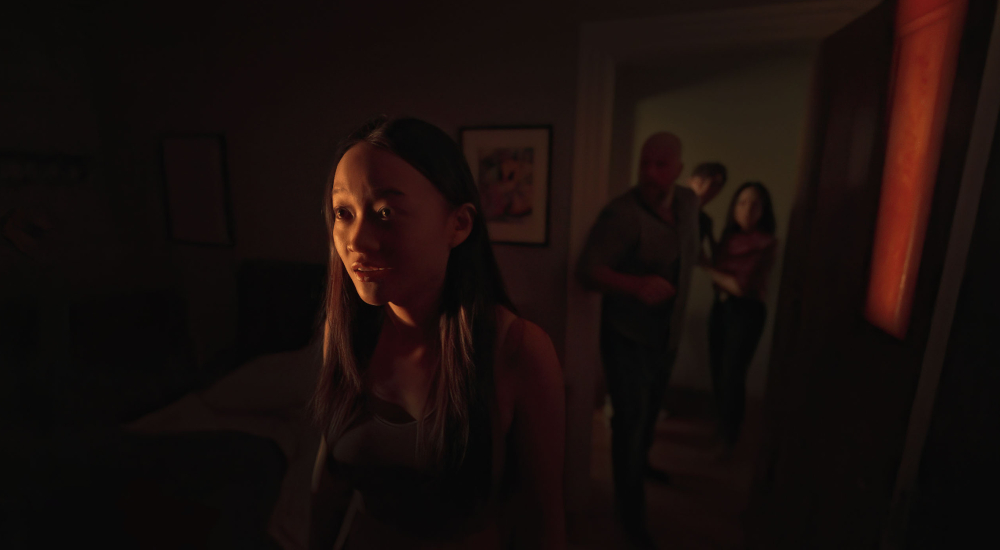"I'm not going in that room."
Confined to a singular, two-story home, Presence marks a return to the basics for director Steven Soderbergh. And while the simplicity would be iconically too much for many, the Oscar-winning director handles the pressure, and the silence, masterfully.
Somewhat centered on the Payne family, Presence is shot entirely from the perspective of a dark entity occupying a home the family has just moved into. While the POV gimmick is understood early on, how Soderbergh maneuvers the camera, capturing raw moments of interaction without being overly intrusive, gives the film its edge.
On a rain-filled afternoon, a realtor, played by Julia Fox, steps hastily through the door. Soon after, her clients follow suit. Rebekah (Lucy Liu) is immediately set on purchasing the home. Before seeing the upstairs, she begins rattling off the terms of an offer. Her husband, Chris (Chris Sullivan), is slightly more cautious. But alas, the family dynamic is set. The home is theirs.
We soon learn that their teenage son Tyler (Eddy Maday) is an exceptional competitive swimmer with a bright future. Their daughter Chloe (Callina Liang) is more sensitive, working to process the grief stemming from the death of her best friend.
Played out in a series of long, intricate takes, separated by sharp, intense cuts to black, the camera floats around the house, drifting in and out of rooms with an omniscient, if not detached, gaze. By pure necessity, it becomes the story's central character.
Initially kept at a healthy distance, the camera inches closer once the family settles in their new space. With no real context on who stands behind the proverbial mask of the camera lens, the audience is left much in the dark.
Is the presence evil? Is it helpful? What is it doing inside the house?
The rules placed within the context of the story are also unknown. Whether the entity can vacate the premise is never fully understood. And the further we venture into the story, the less it matters.
Instead, we focus on the sharp tensions among the Payne family. Though we seldom catch an entire conversation, screenwriter David Koepp offers enough important pieces to allow us to navigate the basics.
Koepp's words, along with Zach Ryan's score, craft a slow build that keeps you engaged and intrigued. Never entirely sure where the story is headed or what new information will thwart your dark suspicions, the film bears a unique doc-style presentation that gives it a natural, authentic feel.
But lackluster dialogue jeopardizes the approach on several occasions, often breaking with Soderbergh's strategy. Fortunately, the cast compensates for the misstep, led by a star-turning performance by newcomer Callina Liang. She and West Mulholland take audiences on a wild ride of uncertainty, pushing the envelope as they explore grief, sex, and control.
As the narrative reaches its apex, loud music blares from downstairs speakers. The added noise triggers panic as the slow-burn embers heat up, transforming into a raging fire. Like a punch to the gut, the proverbial table is flipped. What took nearly ninety minutes to set up is over within seconds. The audience remains still, an audible gasp escaping many of their mouths.
And just like that, Soderbergh's experiment is over—at least in the physical form. Long after the screen fades to black, Presence still lingers in the back of your mind as you work to process the heavy underlying elements that Soderbergh crafts with seeming ease. But his achievement here is extraordinary, its likely influence on the horror sub-genre undeniable. Even though you won't leave the theater in fear, your mind will be heavily occupied.

